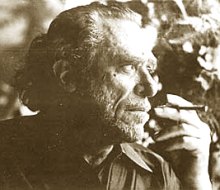
Henry Charles Bukowski was an American poet, novelist, and short story writer. His writing was influenced by the social, cultural, and economic ambience of his adopted home city of Los Angeles. Bukowski's work addresses the ordinary lives of poor Americans, the act of writing, alcohol, relationships with women, and the drudgery of work. The FBI kept a file on him as a result of his column Notes of a Dirty Old Man in the LA underground newspaper Open City.
John Fante was an American novelist, short story writer, and screenwriter. He is best known for his semi-autobiographical novel Ask the Dust (1939) about the life of Arturo Bandini, a struggling writer in Depression-era Los Angeles. It is widely considered the great Los Angeles novel, and is one in a series of four, published between 1938 and 1985, that are now collectively called "The Bandini Quartet". Ask the Dust was adapted into a 2006 film starring Colin Farrell and Salma Hayek. Fante's published works while he lived included five novels, one novella, and a short story collection. Additional works, including two novels, two novellas, and two short story collections, were published posthumously. His screenwriting credits include, most notably, Full of Life, Jeanne Eagels (1957), and the 1962 films Walk on the Wild Side and The Reluctant Saint.
Henry Charles "Hank" Chinaski is the literary alter ego of the American writer Charles Bukowski, appearing in five of Bukowski's novels, a number of his short stories and poems, and the films Barfly and Factotum. Although much of Chinaski's biography is based on Bukowski's own life story, the Chinaski character is still a literary creation that is constructed with the veneer of what the writer Adam Kirsch calls "a pulp fiction hero." Works of fiction that feature the character include Confessions of a Man Insane Enough to Live With the Beasts (1965), Post Office (1971), South of No North (1973), Factotum (1975), Women (1978), Ham on Rye (1982), Hot Water Music (1983), Hollywood (1989), and Septuagenarian Stew (1990). He is also mentioned briefly in the beginning of Bukowski's last novel, Pulp (1994).
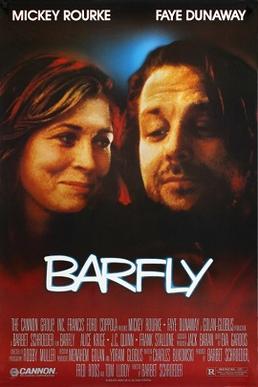
Barfly is a 1987 American black comedy film directed by Barbet Schroeder and starring Mickey Rourke and Faye Dunaway. The film is a semi-autobiography of poet/author Charles Bukowski during the time he spent drinking heavily in Los Angeles, and it presents Bukowski's alter ego Henry Chinaski. The screenplay, written by Bukowski, was commissioned by the Iranian-born Swiss film director Barbet Schroeder, and it was published in 1984, when film production was still pending.
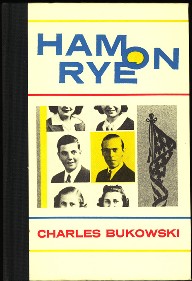
Ham on Rye is a 1982 semi-autobiographical novel by American author and poet Charles Bukowski. Written in the first person, the novel follows Henry Chinaski, Bukowski's thinly veiled alter ego, during his early years. Written in Bukowski's characteristically straightforward prose, the novel tells of his coming-of-age in Los Angeles during the Great Depression.

Post Office is the first novel written by the German-American author Charles Bukowski, published in 1971. The book is an autobiographical memoir of Bukowski's years working at the United States Postal Service. The film rights to the novel were sold in the early 1970s, but a film has not been made thus far.
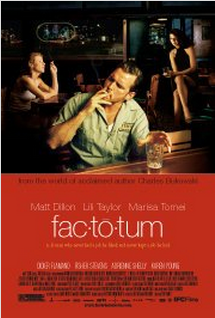
Factotum is a 2005 French-Norwegian dark comedy-drama film co-written and directed by Bent Hamer, adapted from the 1975 novel of the same name by Charles Bukowski. It stars Matt Dillon as Bukowski's alter ego, Henry Chinaski. Although events in the book take place in Los Angeles in the 1940s, the film has a contemporary setting.
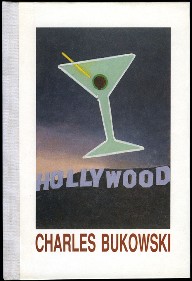
Hollywood is a 1989 novel by Charles Bukowski which fictionalizes his experiences writing the screenplay for the film Barfly and taking part in its tumultuous journey to the silver screen. It is narrated in the first person.

Ask the Dust is the most popular novel of American author John Fante, first published in 1939 and set during the Great Depression era in Los Angeles. It is one of a series of novels featuring the character Arturo Bandini as Fante's alter ego, a young Italian-American from Colorado struggling to make it as a writer in Los Angeles.
Dirty realism is a term coined by Bill Buford of Granta magazine to define a North American literary movement. Writers in this sub-category of realism are said to depict the seamier or more mundane aspects of ordinary life in spare, unadorned language.

Tales of Ordinary Madness is a 1981 film by Italian director Marco Ferreri. It was shot in English in the United States, featuring Ben Gazzara and Ornella Muti in the leading roles. The film's title and subject matter are based on the works and the person of US poet Charles Bukowski, including the short story The Most Beautiful Woman in Town.
John Martin is an American publisher who founded the Black Sparrow Press. As a publisher, he is best known for his work with Charles Bukowski, John Fante, and Paul Bowles. He is based in Santa Rosa, California.
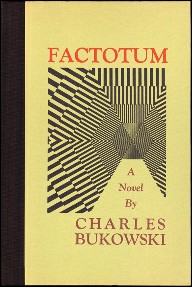
Factotum (1975) is a picaresque novel by American author Charles Bukowski. It is Bukowski’s second novel and a prequel to Post Office (1971).

Pulp is the last completed novel by Los Angeles poet and writer Charles Bukowski. It was published in 1994, shortly before Bukowski's death. He began writing it in 1991 and encountered several problems during its creation. He fell ill during the spring of 1993, only three-quarters of the way through Pulp.
Californication is an American comedy-drama television series, created by Tom Kapinos, which aired for seven seasons on Showtime from August 13, 2007, to June 29, 2014. The show follows New Yorker Hank Moody, a troubled novelist who moves to California and suffers from writer's block. His drinking, womanizing, and drug abuse complicate his relationships with his longtime lover, Karen, and their daughter, Becca . The show's other main characters are Hank's best friend and agent Charlie Runkle and Charlie's wife Marcy. Recurring themes are sex, drugs, and rock and roll, all of which are featured regularly, as well as the seedier side of Los Angeles. The show won several awards, including two Emmy Awards and one Golden Globe Award.

Old Grand-Dad is a brand of bourbon whiskey distilled at the Jim Beam distillery in Clermont, Kentucky. The brand was created by Raymond B. Hayden and named after his grandfather Meredith Basil Hayden Sr., who was a well known distiller during his lifetime. A fanciful portrait of Hayden Sr. is depicted on the front of each bottle. Today, it is owned and produced by Beam Suntory.
Mark SaFranko is an American writer, playwright and actor based in New Jersey. His work is primarily located in the crime and confessional genres. SaFranko has written over 100 short stories, over 50 of which have been printed, as well as poetry, essays, and four novels. He has also written a dozen plays, some produced in New York and others staged in Ireland.
Linda King is an American sculptor, playwright and poet. She is best known for having been the girlfriend of American writer Charles Bukowski for several years in the early 1970s.

Noah Van Sciver is an independent American cartoonist. He currently resides in Columbia, South Carolina.
Charles Bukowski's work has influenced popular culture many times over in many forms, and his work has been referenced in film, television, music and theater.












